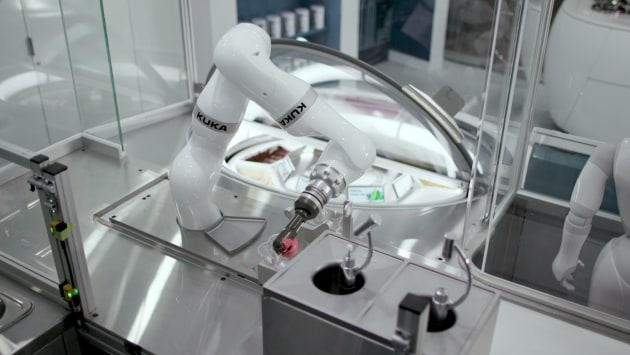Industry 4.0 delivers retail engagement – and it doesn't get much cooler than cobots serving you in a Melbourne ice cream bar. Lindy Hughson went behind the scenes at the world-first retail execution to sample wares delivered by the revolutionary technology.
Collaborative robots (cobots) have begun to make their mark on manufacturing floors, and now they have entered the retail domain. In a world-first, robotic retail technology pioneer Niska has brought to the Australian market an interactive retail experience that incorporates cutting edge robotics and artificial intelligence technology. The store opened in Melbourne today (17 September).
The project, three years in the making, saw Niska collaborate with robotics companies ABB, KUKA and Soft Bank Robotics; engineering company Special Patterns; UNSW; and Phosphor. Consulting on the robotics technology was Greg Sale, director of consulting firm Manufacturing, Technology & Marketing.

“What’s not exciting about robots and ice cream?” Sale quipped when Food & Drink Business went along to Federation Square to get a sneak peek behind the scenes the week before the store opened in this prime tourist location.
Sale ranthrough the in-store experience, demonstrating how the cobots harness advanced robotic technology to create an innovative customer experience filled with meaningful interactions.
He said this is the first time the three distinctive cobot technologies are working alongside each other. The first in line is the concierge cobot, called Pepper, developed by Japanese company Soft Bank.
“The customer places their order with Pepper, the ice cream is scooped by the Kuka LBR iiwa cobot [named Eka], and the toppings are placed on the ice cream by ABB’s Yumi cobot. Yumi [Tony] also dispenses water and chocolate bars, which are an option that customers can select when they order,” Sale explains, stressing that this operation is fully robotic from end to end.
Apart from the obvious novelty factor that will be a drawcard for locals and tourists alike, there is a clear business strategy behind the development.
Kate Orlova, Niska CEO and co-founder tells PKN that she and her business partner Anton Morus had previously run a chocolate manufacturing facility that was open for tourists to observe the manufacturing process. In running this establishment, they faced some challenges as small business operator, spending too much time hands-on, with little time to think creatively about how to grow the business and respond to consumer preferences.

In developing this automated and autonomously-operated run ice cream bar, they believe they have found a different way of running a business that frees up the owner to have a better quality of working life and develop ideas that will create a more profitable operation.
“This ice cream bar is a solution that creates a new type of occupation for business owners, as well as providing a better solution for franchising chains in Australia – but we see this project [rolling out] on a global scale as well,” she says.
The business owner can run everything from smart devices, she explains, and will be able to choose when to visit the store. Everything is automated, including stock ordering.
“It frees up the business owner to be creative, to spend time with customers getting their feedback while the store operates autonomously. You can work on the business rather than in the business,” she says.

Sale adds: “This is not just theatre, it is potentially a very profitable business.”
Orlova says that, for Niska, ice-cream is just the beginning: the company is looking to expand the robotics into other areas of retail. If the concept proves a success, there is potential for global franchising and, in that case, the technology would be exported from Australia.
Braeside-based engineering company Special Patterns’ robotics division designed and manufactured the units installed in the store and brought the robot bar to life. On the day we visited the store, the team was in situ doing the final testing.
The engineering time on the project was around ten months, and the team on site agreed that this is one of the most interesting engineering projects they have worked on, and the first time with a retail application of robotics.
Keeping the concept tastefully Australian, Niska has ensured the ice cream served in the store is Australian-made gourmet and artisan ice cream, the water is bottled locally in NSW under the Niska brand, and the chocolate bars are also artisan-made in Australia.
As part of the curated merchandise offer, Niska is also selling t-shirts, caps and mini robots in branded packaging.
As a final question, we had to ask about the end-of-life on the disposable bowls into which the cobots scoop the ice cream. Orlova says sustainability is a key concern for the business so they chose bowls made from clear polycarbonate [recyclable p5 grade]. Niska has a recycling collection bin on the site, and in-store communication encourages consumers to dispose of the bowls in the purpose-designed bin so Niska can ensure proper recycling.
Niska’s ice cream bar is now open and is located at Tenancy 20, Crossbar Building Federation Square, Melbourne.
You can watch the promotional video here:
https://www.youtube.com/watch?v=xp5NIJ9kwME













